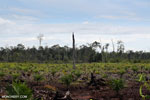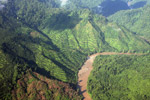The Roundtable on Sustainable Palm Oil (RSPO) has evicted Indonesian palm oil giant Dutapalma Nusantara for violating key principles for sustainability.
Dutapalma Nusantara, which is also known as Darmex Agro or Duta Palma, was found to have violated three RSPO principles: converting deep peat for a plantation, clearing forest without a high conservation value (HCV) assessment, and using fire to open land. The company repeatedly failed to address the issues, which were raised by the Indonesia Community Mapping Network via RSPO’s complaint system.
“The Executive Board finds that PT Dutapalma Nusantara / PT Darmex Agro have not
demonstrated commitment to address the issue nor acted in compliance with the Code of
Conduct,” said the RSPO in a statement posted on its web site. “Despite numerous directives from the RSPO to resolve the complaint, there was
complete reticence and lack of response from the company. The company merely attempted to
refute the allegations by using the issue of ownership of the companies involved.”
“Therefore, the Executive Board has decided to terminate the RSPO membership of PT
Dutapalma Nusantara and PT Darmex Agro with immediate effect on the grounds indicated
above. In concurrence with this, PT Dutapalma Nusantara/PT Darmex Agro must remove all
references to the RSPO on its website and from all other communication in whatever form within
seven (7) days from the date of this letter.”

Palma Satu, Indragiri Hulu, Riau, September 2011: Haze from fire and burnt tree stumps within recently cleared peatland forest; 0°34’54”S
102°37’55.2”E ©Ifansasti/Greenpeace
The move comes less than three weeks after a Greenpeace cited Duta Palma as a case study for the failings of the RSPO to prevent deforestation. When the report was released, RSPO implied that action against Duta Palma was imminent.
Greenpeace has been investigating Duta Palma since 2007 and its Indonesian branch has done a series of colorful campaigns against the company over that period for alleged abuses. Duta Palma has faced several government investigations during that time, the results of which have never been made public, according to Greenpeace.
Duta Palma says it is one of the largest palm oil companies in Indonesia, producing some 432,000 tons of crude palm oil annually, according to its web site. It has at least 155,000 ha of plantations in Riau and Jambi in Sumatra and West Kalimantan in Indonesian Borneo.
Duta Palma has not replied to multiple requests for comment from Mongabay.com.
Related articles
Indonesian palm oil giant cutting deforestation from supply chain

(05/13/2013) Indonesian palm oil giant Golden Agri-Resources (GAR) is continuing to reduce deforestation under its 2011 forest conservation policy despite ongoing forest destruction by other palm oil producers in the sector, finds a new assessment by Greenomics, an Indonesian activist group. However the report finds GAR’s operations are not completely deforestation-free.
Probe confirms Singapore-based palm oil company engaged in land-grabbing in Borneo
(04/26/2013) An independent investigation has shown that First Resources Ltd, a palm oil plantation company and member of the Roundtable on Sustainable Palm Oil (RSPO), failed to obtain proper consent from local communities before clearing rainforests for plantations in Indonesian Borneo, an Indonesian indigenous rights group reported last week.
Environmentalists unhappy with new palm oil standard

(04/25/2013) Environmentalists are unhappy with Thursday’s approval of new criteria for the world’s leading palm oil certification standard. After members of the Roundtable on Sustainable Palm Oil (RSPO) in a special assembly approved the body’s new ‘principles and criteria’ (P&Cs) for palm oil certification, several groups voiced concern that the rules won’t protect against conversion of carbon-dense rainforests and peatlands for oil palm plantations.
Indonesian palm oil giant clearing peat forest despite its RSPO membership, alleges Greenpeace
(04/25/2013) A major Indonesian palm oil producer continues to clear rainforests in Sumatra despite being a prominent member of the Roundtable on Sustainable Palm Oil (RSPO), casting doubts on the body’s effectiveness in limiting deforestation, alleges a new report from Greenpeace.
RSPO failing to meet sustainability objectives for palm oil production, says WWF
(04/23/2013) An initiative that aims to improve the social and environmental performance of palm oil production is faltering in its mission by failing to establish strong performance standards on greenhouse gas emissions and pesticide use, argues a new statement issued by WWF, the initiative’s biggest green supporter.
Indonesian palm oil industry would support land swaps to protect forest, while expanding production

(04/19/2013) Indonesian palm oil companies would support land swaps as a means to reduce carbon emissions from deforestation while simultaneously expanding production, representatives from the country’s largest association of palm oil producers told mongabay.com in an interview last month.
Breakthrough? Controversial palm oil company signs rainforest pact

(02/09/2011) One of the world’s highest profile and most controversial palm oil companies, Golden Agri-Resources Limited (GAR), has signed an agreement committing it to protect tropical forests and peatlands in Indonesia. The deal—signed with The Forest Trust, an environmental group that works with companies to improve their supply chains—could have significant ramifications for how palm oil is produced in the country, which is the world’s largest producer of palm oil.
Greening the world with palm oil?

(01/26/2011) The commercial shows a typical office setting. A worker sits drearily at a desk, shredding papers and watching minutes tick by on the clock. When his break comes, he takes out a Nestle KitKat bar. As he tears into the package, the viewer, but not the office worker, notices something is amiss—what should be chocolate has been replaced by the dark hairy finger of an orangutan. With the jarring crunch of teeth breaking through bone, the worker bites into the “bar.” Drops of blood fall on the keyboard and run down his face. His officemates stare, horrified. The advertisement cuts to a solitary tree standing amid a deforested landscape. A chainsaw whines. The message: Palm oil—an ingredient in many Nestle products—is killing orangutans by destroying their habitat, the rainforests of Borneo and Sumatra.